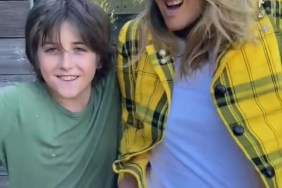Tim Robbins is a busy man. The Oscar-winning filmmaker is doing the rounds for his latest drama, the breezy and thoughtful A Perfect Day, which stars Robbins and Benicio Del Toro as aid workers in Bosnia, whose mission – to find a single rope to pull a body out of a well – has strange unexpected consequences. He’s also deeply involved in The Actor’s Gang and their ongoing Prison Project, which provides acting workshops for the correctional system. He’s working on plays and starring in movies every year.
So we’re lucky that Tim Robbins took the time to talk with us, and especially that he was willing to spend some of that valuable time reflecting on Howard the Duck and the jingoism of Top Gun and whether a sequel to his political satire Bob Roberts would be like Mad Max. But he did, and we’re grateful.
A Perfect Day arrives in theaters and On Demand on January 15, 2016.

IFC
Crave: I’ve seen a lot of your movies, and I feel like A Perfect Day may be the most rope-centric film you’ve ever made.
Tim Robbins: [Laughs.] That’s for sure. There’s more mention of rope in A Perfect Day than in all of my films combined.
I think there’s more mention of rope than in the movie Rope. Is that unusual story part of the appeal of A Perfect Day, or were you just looking at your character?
Well I was looking at the whole script and the story it was telling and the people it was telling a story about, and we haven’t seen very many stories about aid workers. When you meet them, as I have in the past – and I did before I made this film – it’s a very unique kind of individual. It’s the kind of person who wakes up in the morning and says, “You know where I have to be? I have to in Syria.” You know, that person who runs toward the fire rather than away from it? That only feels whole when they’re living in a situation that’s dangerous and life-threatening.
And it’s something that’s really compelling about these people, that they would not only have the hearts to risk danger and to try to provide help for people, but also do so with such aplomb and such vigor. With incredible senses of humor. Dark senses of humor that get them through the darkness. It’s quite an interesting group of people and I thought, well, here’s an opportunity to tell their story. So I leaped at the opportunity, and also the opportunity to work with Benicio Del Toro, who is one of my favorite actors.

IFC
A lot of the film plays a bit like Catch-22. You’re trapped in such an impossible situation, and yet everyone approaches it with good humor. Do think that’s a lesson we can all apply in our lives, or is that gallows humor what these people need to survive?
I think it’s something they have to do. If you think about the things that these people witness and the abhorrent part of human nature that compels people to violence and retribution, dealing with the aftermath of that is very difficult to do. So I think they need their senses of humor in order to survive.
As an artist I’ve seen you tackle important and difficult subject with humor, and yet also as an extreme drama. I’m thinking about, for example, Bob Roberts vs. Dead Man Walking. How do you decide what’s appropriate for the situation? I can’t imagine a lot of humor in a film like Dead Man Walking…
Yes, well, they’re two different kinds of films. One is a satire and the other is a flat out drama. But I’m always looking for the complexities in human nature. The dichotomies, the surprises. How do you portray a world and get it right? And I believe the only way I think that you can do that is by losing your own personal feelings and political beliefs about a situation and trying to figure out the humanity in the most difficult situation. Trying to find the humanity in the person that you might disagree with.
And always approaching, in whatever material I have ever done, and I learned this from The Actor’s Gang in the ‘80s… always approaching whatever the material is with the idea that people are going to see this and it is in its own way entertainment. So one has to find the humor in the midst of the darkness and one has to find the darkness in the midst of the lightness and the humor, in order to really capture the world as it truly exists.
We don’t live in a black and white world. We live in a world with a lot of greys and a lot of subtleties and a lot of dichotomies and a lot of hypocrisies. So it’s part of our job, I believe, to find the complexities of all of that when we’re trying to tell a story.

Paramount Pictures
Do you look at, for example, the contemporary political situation and think about Bob Roberts at all? I often wonder what would have happened to him after the film was over.
Yeah, I mean certainly there are a lot of Trump parallels here. Successful businessman going to become a politician, with a folksy sense of humor. But you know… [Laughs.] In a way, the moment that for me was really interesting was when [Donald Trump] hosted Saturday Night Live and you know, our character Bob Roberts was on a Saturday Night Live type show in the movie and winds up singing a song that he wasn’t supposed to sing and angers a couple of people there.
But you know, what I was doing with that movie was [trying] to shed a light on some of the hypocrisies that exist in the American political system and the way the media covers politics, and unfortunately that is still relevant and that movie still works today.
If anything I think it’s ripe for a sequel.
You think?
You know what I think about when I think about Bob Roberts? I think about The Dead Zone, and the apocalyptic future that might come from someone like Bob Roberts actually achieving power.
[Laughs.] Yeah, well, so you’re talking about kind of a Mad Max kind of movie with Bob Roberts as the emperor supreme?
Kind of, yeah!
I’ll get to work on that tomorrow! [Laughs.]

Paramount Pictures
There are two movies of yours that are celebrating anniversaries this year, and in some respects they couldn’t be more different. I’m sure you’ve talked about Top Gun many a time, but you’ve got such a small yet pivotal role. I have to ask what you think of it now, looking back?
Honestly I haven’t seen that movie since it came out, so I wonder what I would think. You know that was a movie that enabled me to pay the rent for a good two years and do a lot of theater. At the time when I read it the script was a little bit different than the way it came out, so I wasn’t attuned to its other messages. So it taught me a lesson on… well, it taught me a couple lessons on entertainment and how important the decisions you make are.
And also, there’s a difference between when you’re surviving as an actor and a job comes up and you don’t have money to pay the rent and it’s your survival. There’s a big difference between that and when you have actually the choice of material and when you can say no. So I believe that my ability to say “no” over the course of the last twenty years has been something that has been beneficial for me.
The messages you were talking about in Top Gun, do you mean the pro-military mindset that came out of it?
Not necessarily pro-military, because one of the great experiences I had on that film, having never been in the military, was to be around of military people and to understand the human face of that. A lot of the people I met who were serving our country at the time were great guys. So it gave me a wider perspective on the military at the time.
But I’m talking more about the nature of how the film was received and the… shall we say the “jingoistic” nature of how it was received, which is a reflection on the culture and on the movie, but not on the military itself.

LucasFilm
The other film of yours that’s turning 30 this year is a movie I unapologetically love. It’s Howard the Duck. I know that must have been a strange experience for you on a variety of levels. Do you look back on Howard the Duck with any fondness?
Well, I look back at it and I realize that one of the things I think about was, at the time, I got this big job that was paying a really decent salary and it was for George Lucas, who had just come off three Star Wars films. So it was a huge deal at the time. And then it wound up going over its shooting schedule and I wound up getting paid twice for that movie because of all the overtime. So I think more about that than about the quality of the movie. [Laughs.] I think more about that allowing me [the] opportunity to do a movie like Five Corners and to produce great plays with The Actor’s Gang, because of the money I was able to take in on that movie.
You know, it could have been a better movie for sure. I think one of the things that we realized at the time was – at least I did from the very first day – was that the duck was kind of miscast. [Laughs.] We got the wrong duck to be in the movie. And I don’t mean the people that were inside the suit, I mean kind of the design and concept of who the character was. In the comic book it was this cigar-chomping, rude, skirt-chasing duck, and it got kind of cute-ified in the movie and when I saw that on the set – it was very early on, one of the first days we were shooting – I was worried. I was worried at the start.
Top Photo: Europa Press
William Bibbiani (everyone calls him ‘Bibbs’) is Crave’s film content editor and critic. You can hear him every week on The B-Movies Podcast and watch him on the weekly YouTube series Most Craved and What the Flick. Follow his rantings on Twitter at @WilliamBibbiani.








